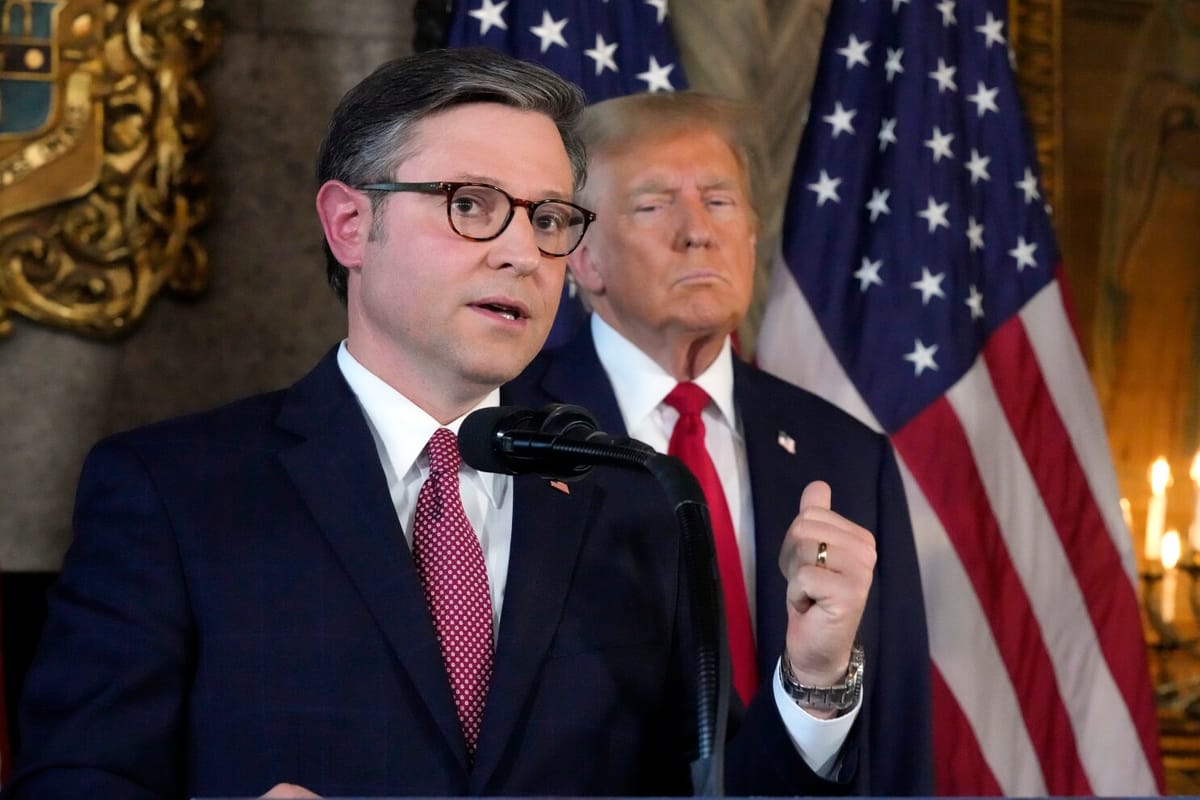Trump, Musk, and the Chaos That Nearly Triggered a Government Shutdown: A 24-Hour Schism That Shook GOP Unity
Donald Trump's public rift with House Speaker Mike Johnson, fueled by Elon Musk’s social media barrage, nearly derailed a critical government funding deal and pushed the U.S. to the brink of a shutdown. Here's how a 24-hour drama exposed deep divisions within the GOP.

In a chaotic and dramatic 24-hour period this week, a rift between President-elect Donald Trump and House Speaker Mike Johnson nearly pushed the U.S. government into a shutdown. Fueled by a social media blitz from Elon Musk and Trump’s shifting demands, the crisis revealed deep divisions within the Republican Party over fiscal policy, government spending, and the direction of Trump’s second term.
While Trump had long been supportive of Johnson, even publicly backing the Louisiana Republican’s leadership, this sudden and intense rupture caught many GOP lawmakers off guard. The fallout from this short, turbulent window left Capitol Hill scrambling for answers and sent shockwaves through both the House Republican caucus and the broader political landscape.
A Shocking Turn of Events
Trump's previously strong alliance with Speaker Johnson came under fire on Wednesday afternoon after Elon Musk, with Trump's apparent approval, launched a barrage of posts on X (formerly Twitter), calling a key government funding deal “criminal” and condemning its terms. Musk’s public opposition, which began early that day, was a game-changer. By mid-afternoon, Trump weighed in with his own criticisms, threatening to oppose any Republican who voted in favor of the deal in a 2026 primary.
What followed was nothing short of a GOP implosion. Trump's intervention, along with Musk’s influence, torpedoed what had been an agreement between Johnson and congressional leaders to extend government funding for three months while addressing other critical issues, including the debt ceiling. The bill, which had support from many GOP lawmakers, ultimately failed, and by Thursday, House Republicans were in disarray.
One GOP lawmaker summed up the situation: “This was completely avoidable. It all just fell apart in one day.”
Trump’s Sudden Shift: A Battle for Control
The discord between Trump and Johnson escalated in the days leading up to Wednesday’s fiasco. On the weekend, Trump and Johnson had shared a private moment at the Army-Navy football game, where the President-elect made it clear to Johnson that he wanted to tackle more contentious issues—like the debt ceiling—immediately. Trump told Johnson that he wanted a full-year spending bill, not just a short-term extension, and that the debt limit should be lifted or eliminated altogether as part of the deal.
While Johnson sought to calm Trump’s concerns, telling him that a deal for a full-year spending bill wasn’t possible given the limited time frame, the conversation set the stage for the explosive 24-hour drama that would follow.
Sources close to the situation suggested that Trump and his team were aware of the broader details of the bill throughout the week, but it wasn’t until the text of the deal began circulating on Wednesday that Trump saw the proposal in full. The deal, which included provisions like $110 billion for disaster relief, a temporary extension of the farm bill, and other elements, didn’t sit well with Trump. He viewed it as too expensive and a capitulation to Democratic demands.
“It was the pork,” one Trump adviser said, referencing the extra spending that Trump and Musk opposed. “Once the details came out, Trump got involved.”
Trump and Musk began discussing the deal on social media even before Musk’s posts intensified. Musk criticized the funding proposal, and sources say Trump was in full agreement. The power dynamic shifted quickly: what had started as a routine funding debate turned into a political firestorm fueled by the President-elect’s influence and Musk’s far-reaching online platform.
The Role of Musk: A Surprising Influencer in Republican Politics
What was perhaps most shocking to many was the growing influence of Elon Musk in shaping Republican strategy. Musk, who had previously stayed mostly out of Washington’s political fights, now seemed to hold significant sway over Trump’s decisions. On Wednesday, Musk’s posts ramped up, criticizing the government funding deal as “too much spending” and warning of disastrous consequences if Republicans voted for it. The social media mogul's early intervention helped turn what was a quiet brewing controversy into a full-blown GOP crisis.
Some Republicans were stunned at how much influence Musk seemed to have over Trump, with some speculating that Trump’s position might have been shaped by Musk’s criticism rather than his own views. A source close to the situation noted that Trump’s decision to join the fray was "a direct response to Musk's firestorm on social media."
"Musk’s influence here is undeniable," the source added. "It’s clear he’s got Trump’s ear."
By the end of the day on Wednesday, Trump’s public stance against the deal was clear, and the GOP had no clear path forward. House Republicans, initially optimistic that the deal could pass, were suddenly faced with internal rebellion, and with Musk's online following fueling opposition, the deal was doomed to fail.
Whiplash: Trump Backs Johnson, Then Undermines Him
In a bizarre twist, just hours after undermining Johnson's efforts to pass the deal, Trump seemed to reverse course. By Thursday evening, he was back on board with Johnson, who had pivoted to a new plan in response to Trump’s criticism. But the damage had already been done. 38 Republicans voted against Johnson’s new plan, and the government was on the brink of a shutdown, set to expire by the end of the week.
As the GOP meltdown continued, Johnson, who had been appointed Speaker just weeks earlier, found himself increasingly isolated. The internal divisions within his party were becoming painfully evident, and the Republican majority in the House seemed incapable of advancing any meaningful solutions. One lawmaker described Johnson’s leadership as “weak,” especially in light of how the situation had unfolded over such a short time.
A Divided GOP: The Impact of Trump’s Influence
The entire debacle raised serious questions about Republican leadership in the upcoming year, particularly as Trump prepares for a potential second term. Some GOP members expressed concerns that the party, already fractured by competing factions, was ill-prepared to govern effectively under Trump’s direction. In the chaos of Wednesday and Thursday, it was apparent that Trump was playing a far more hands-on role than many had anticipated.
Many Republican lawmakers are now worried about how much control Trump will have over the GOP once he returns to office. If the 2024 election sees Trump victorious, it could signal a further shift in Republican strategy, with Trump and his allies potentially consolidating power at the expense of the party’s more traditional leadership.
The Fallout: Democrats Refuse to Help Johnson Again
In the wake of this week’s drama, Democrats—who had helped Johnson retain his Speaker position earlier in the year—have made it clear they are no longer willing to bail him out. Rep. Hakeem Jeffries (D-NY), the House Minority Leader, said flatly, "We’ve done enough to help him. He’s on his own now."
With the debt ceiling, government funding, and other crucial issues looming, Johnson will need to find a way to unite his increasingly fractured party. But if Musk and Trump continue to pull the strings behind the scenes, the future of Republican governance seems uncertain.
Conclusion: The Future of the GOP and the Shutdown Threat
In just 24 hours, Trump, Musk, and Mike Johnson exposed the chaos and weakness within the Republican Party, pushing the government to the brink of a shutdown. As Trump’s influence continues to shape the GOP’s direction, the party’s ability to govern effectively remains in question.
What’s clear is that the Republican Party is far from unified, and with Trump’s demands shaping the agenda, the next few months will be crucial in determining whether the GOP can overcome these internal divisions—or whether they will continue to spiral into dysfunction.



